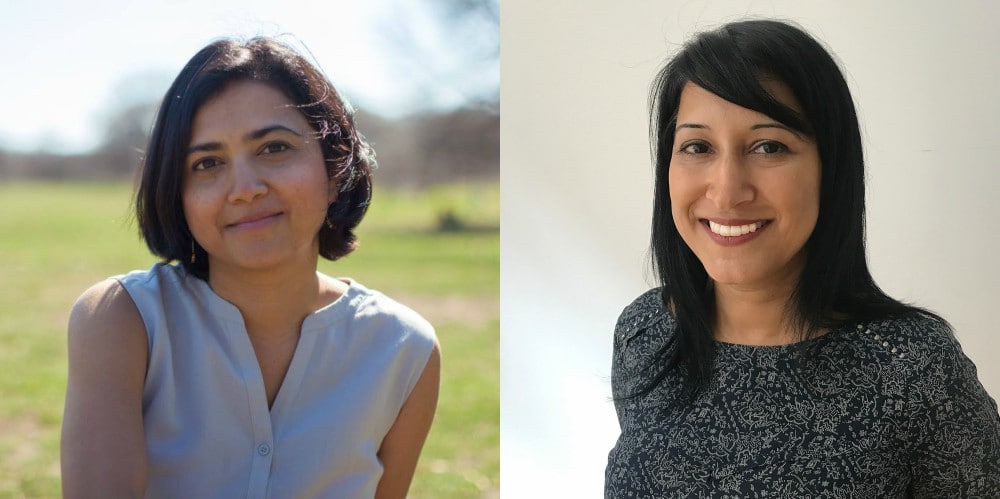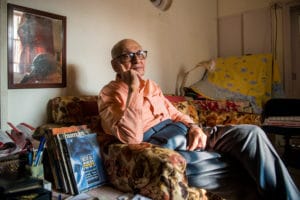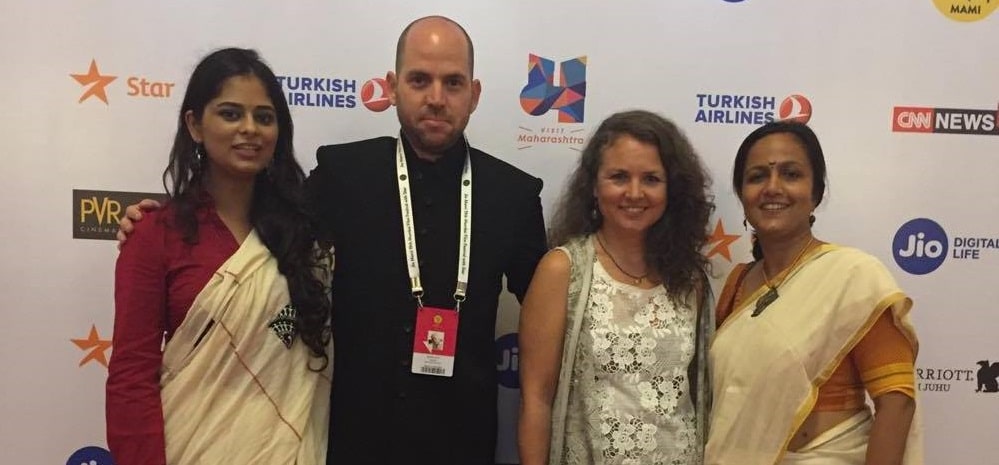Life
How Two Indian American Women & A 93-Year-Old ‘Sexpert’ are Talking Taboos

Filmmakers Vaishali Sinha left) and Mridu Chandra
Sexologist Dr. Mahinder Watsa's work shines light on Indian society, say Vaishali Sinha and Mridu Chandra on their documentary, Ask the Sexpert.
Two Indian American women with a love of cinema met in New York and found that besides their love of the big screen, they share a passion for social justice. Documentary filmmakers Vaishali Sinha and Mridu Chandra, the director and producer of Ask the Sexpert, respectively, came together to make a film on Dr. Mahinder Watsa, said to be India’s most popular and witty sexologist.
Sinha, who had earlier made films on sexual and reproductive health and rights, decided that she wanted to move on creating something “that could get back to the basics.” She chose to make a film on sex education, a phrase spoken in hushed terms in India even though the country has a teenage pregnancy problem.
“In my research, I quickly came across the iconic Dr. Watsa. At 93, he continues to be relevant and in demand,” Sinha tells Little India about the Mumbai-based columnist known for answering readers’ queries on sexual issues in an easy yet clever style that stays away from sounding pedantic. Through his work as a gynecologist and obstetrician, and then as a newspaper columnist for over 50 years, Watsa became aware of the lack of sex education in India. On his advice, the Family Planning Association of India (FPAI) started the country’s first sex education, counseling, and therapy center in Mumbai and Delhi 1978. It was estimated in 2014 that Watsa’s Ask the Sexpert column had received over 40,000 letters in the nine years since it began in the Mumbai Mirror newspaper.

Dr Mahinder Watsa
“His work shines a light on modern day Indian society. He has also influenced pop culture and generations of Indians who’ve been avid readers of his column,” says Sinha.
Chandra comes across as a huge fan of Watsa too. She met him for the first time only last month, when the film was screened at Jio Mumbai Academy of Moving Image (MAMI) Festival. “He is an inspiration for the pioneering work he has done to emphasize the importance of providing sexual health information in India,” says Chandra, who grew up in Virginia, talking about how Watsa advocates healthy sexual relationships based on mutual consent and pleasure. “He is such a sharp and motivated being. And he is a great listener, which makes him the terrific therapist and doctor that he is.”
The documentary delves into Watsa’s life, showcasing his everyday family routine, as well as his daily schedule at work, with shots revealing him going through his mail, and dictating answers to his assistance, or counselling patients who approach him in person. The filmmakers interviewed Watsa’s family members, including his son and his daughter-in-law, friends and colleagues to give viewers a glimpse of the respect he commands for his work.
Telling the story of sex education, or the lack of it, in India through a humorous lens makes the topic accessible and relatable, which is what Sinha and Chandra tried to do. And were successful at. The documentary received the Best Documentary Feature Award at the New Orleans Film Festival last month.
During her research and filmmaking, Sinha, who grew up in Mumbai, found that Indians, at least those living in urban areas, of all classes are willing and ready to discuss sex education. Many, including parents, even expressed the need for it.
“I find there are more and more initiatives to take these discussions forward, but as my subjects say in the film, school is the best place to institute a curriculum,” says Sinha, adding that currently, however, sex education is banned in eight Indian states, and there is a severe lack of discussion on the meaning of comprehensive sex education.
“There is also a severe lack of sex educators,” she stresses. Which perhaps explains questions such as, “I’m a 20-year-old woman. Is there a chance of becoming pregnant after watching porn videos?”, that Watsa fields in his column. His answer: “Where will the men go if videos can do the trick?”
According to Unicef’s The State Of World’s Children, 2016 report, 71.50 per cent of adolescent girls and 88.20 per cent of adolescent boys in India use mass media, including regional and Bollywood movies, and pornographic material, which in most cases is misogynistic, for sex education.
It was not easy to make Ask the Sexpert, the filmmakers say. The duo spent a lot of time strategizing the project, and the various possibilities of making it with the limited funding they had. They ultimately received sufficient funding from ITVS, and could really focus on the story. “Dr. Watsa is a terrific subject and it was a lot of fun to think through how to tell this story of a 93-year old man who gives sex advice,” says Chandra.
The movie has been screened in 10 countries since May 2017. This month, it will be shown at the world’s largest documentary film festival IDFA in Amsterdam, as well as film festivals in Virginia, New York City, and St. Louis.
“New York has a big community of documentary filmmakers and supporters,” says Sinha, who has earlier directed documentaries titled Made in India, My Kashmir and Red Roses. She moved to the city to study film production in 2004, and now lives there with her husband and son. She credits the country with giving her an opportunity to steadily build a career in documentary filmmaking, which, she says, would not have been possible in India in the 2000s. “It’s been huge for me to draw energy from the camaraderie, friendships and love I’ve been offered here.”
One such bond she has formed is, of course, with Chandra, who grew up watching Bollywood, including art films of the ’70s and ’80s with Smita Patil and Shabana Azmi, as “one of the ways” to stay connected to India.
“I never really thought I could be in the film business until I saw films by Ang Lee in the 90s,” Chandra recalls. “Here was this guy from Taiwan making movies that I loved and he was recognized by Hollywood. That had a big impact on me, to see a non-white American success story in the mainstream media.” Lee, along with other independent American filmmakers like Spike Lee and Haile Gerima inspired her to move to New York after graduate school and give filmmaking a try. “My path became one of producing primarily social issue and justice-oriented documentaries,” says the award-winning producer of films that focus mostly on diversity.
One of her next projects is called India in America. It is a series of short documentaries that she conceived a few years back on profiles of the lives of Indian Americans. The first film in the series of three, titled Indian Summer, is ready. It tells the story of a group of teens at a Hindu summer camp in upstate New York.
“I’m interested in showing how we navigate our identity and how we participate in America,” she adds, confessing that she did not always value her dual identity while growing up. “But I grew to understand how empowering it is to be both Indian and American,” she says. “You always have another example in your back pocket of how things can be done, and that helps me choose what I feel is right even when the approach may be different.”

